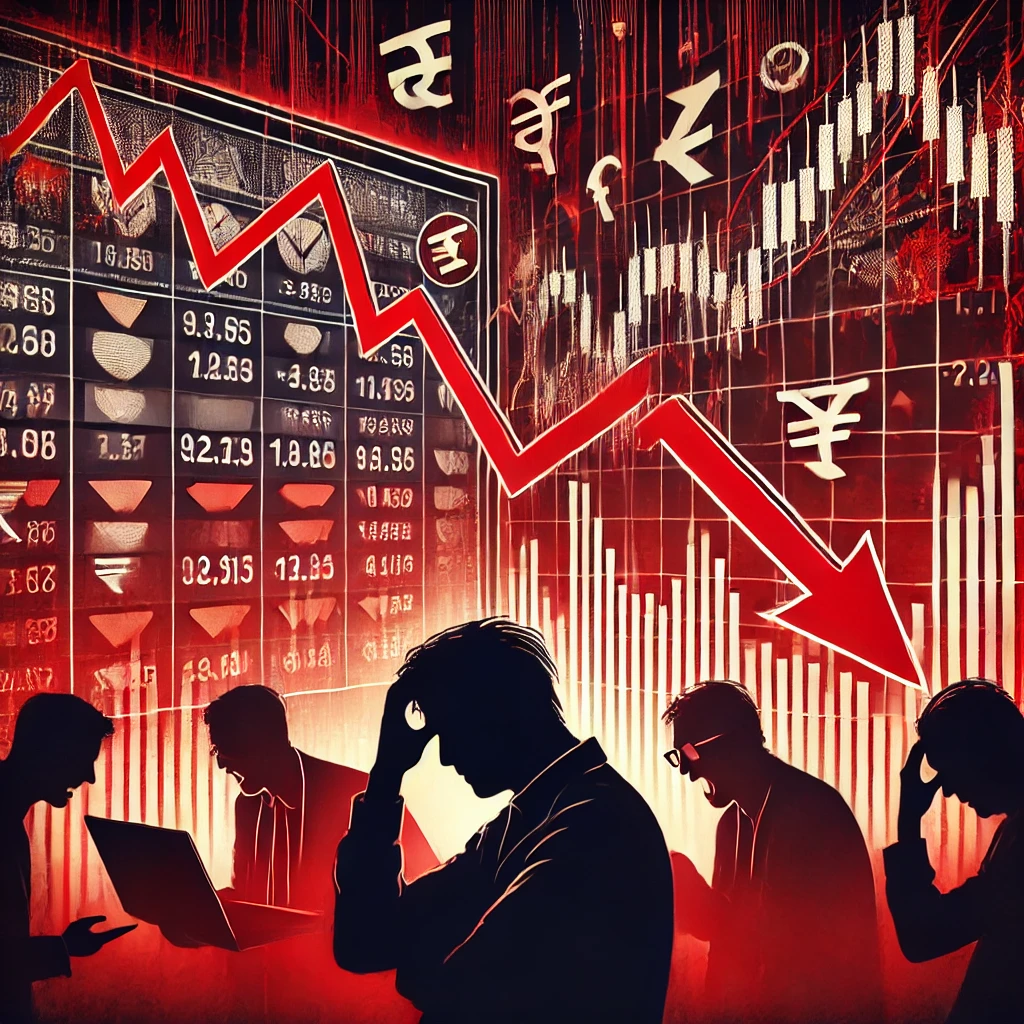Unbelievable! Stock Market Crash: Why Sensex Loses Over 1,000 Points, Nifty Below 24,400 Today (17th December)
The Indian stock markets witnessed a significant downturn on 17th December, with the Sensex Loses over 1,000 points and the Nifty slipping below the crucial 24,400 mark. This sharp decline has left investors concerned about the underlying causes and the broader implications for the market and economy. Here’s an in-depth look into what triggered this crash and what it means for the future.

Key Highlights:
- Sensex: Down by over 1,000 points.
- Nifty: Fell below 24,400.
- Major sectors impacted: Banking, IT, and energy.
Reasons Behind the Market Crash
1. Global Economic Uncertainty
A ripple effect from global markets has been a major contributor to this crash. Investors are reacting to the uncertainty surrounding major global events, including:
- US Federal Reserve Policy: Speculation about interest rate hikes has increased market volatility.
- Geopolitical Tensions: Ongoing conflicts in key regions have added to the global risk aversion.
- Weak Global Economic Data: Sluggish growth numbers from leading economies have dampened investor sentiment worldwide.
2. Domestic Economic Concerns
India’s domestic economic landscape has also played a role in this downturn:
- Rising Inflation: Persistent inflation has raised concerns about reduced purchasing power and slower economic growth.
- Weak Industrial Output: Recent data showed a slowdown in industrial production, further spooking the markets.
- Fiscal Deficit Worries: Growing government expenditure has led to concerns about the fiscal deficit widening.
3. FII and DII Activity
Foreign Institutional Investors (FIIs) have been net sellers in the Indian markets over the past few sessions. This outflow of funds has put additional pressure on the indices. Domestic Institutional Investors (DIIs), despite some buying activity, have not been able to offset the heavy selling pressure.
4. Sector-Specific Weaknesses
- Banking Stocks: Rising Non-Performing Assets (NPAs) and concerns about future loan defaults have hit banking stocks hard.
- IT Sector: Weak demand forecasts in the global IT market have dragged down major IT stocks.
- Energy Stocks: Fluctuating crude oil prices and policy uncertainties have negatively impacted energy companies.
Impact on Investors-Unbelievable! Sensex Loses Over 1,000 Points in a Day Know
1. Retail Investors
Retail investors have been the worst hit by this crash. Many are struggling to navigate the volatile market, with stop-losses being triggered and portfolios taking a significant hit.
2. Long-Term Investors
While long-term investors typically weather short-term volatility, the scale of this crash has raised concerns about the sustainability of their investments in certain sectors.
3. Mutual Fund Holders
Investors in equity mutual funds are also feeling the heat, as the net asset values (NAVs) of many funds have dropped sharply.
What Lies Ahead for the Markets?
1. Short-Term Outlook
In the short term, volatility is expected to persist. Investors should brace for further fluctuations as global and domestic factors continue to unfold.
2. Long-Term Prospects
India’s long-term growth story remains intact, with robust fundamentals and government initiatives aimed at boosting the economy. However, investors should:
- Diversify their portfolios.
- Focus on fundamentally strong stocks.
- Avoid panic selling during market dips.
3. Expert Recommendations
Market analysts suggest the following strategies:
- For New Investors: Stay on the sidelines until the market stabilizes.
- For Experienced Investors: Use this correction to identify value-buying opportunities in high-quality stocks.
Conclusion-Unbelievable! Sensex Loses Over 1,000 Points in a Day Know
The 17th December crash in the Sensex and Nifty has been a stark reminder of the volatility inherent in stock markets. While the immediate triggers are a mix of global and domestic factors, the long-term outlook for India’s economy and markets remains positive. Investors are advised to remain cautious, conduct thorough research, and consult financial advisors before making any major investment decisions.
By staying informed and adopting a disciplined approach, investors can navigate this challenging phase and emerge stronger when the markets rebound.
Dr. Dinesh Sharma is an award-winning CFO and AI strategist with over two decades of experience in financial leadership, digital transformation, and business optimization. As the founder of multiple niche platforms—including WorldVirtualCFO.com—he empowers professionals and organizations with strategic insights, system structuring, and innovative tools for sustainable growth. His blogs and e-books blend precision with vision, making complex financial and technological concepts accessible and actionable.